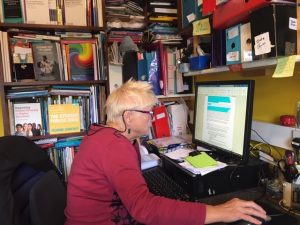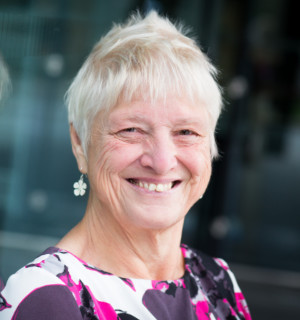Today Kay Sambell and I presented a keynote at the International Enterprise and Entrepreneurship Conference online on the topic of Making assessment future fit: ensuring authentic assessment approaches in the light of Coronavirus changes to HE practice. Our key messages were that assessment must be authentic if it is to be fit-for-purpose, and that now is the best chance in our working lifetimes to change assessment for the better, having had to make rapid changes in the pandemic. The slides are here: Enterprise-conf-Sept-2020-SBKS.pptx (1301 downloads) We must never revert to the bad old ways again.
First steps for Freshers Friendly Facilitation
7 Sep
Plenty of universities are wondering what are the most urgent things to do to build a sense of community among new student starting this autumn in the event of another covert surge. My Wonkhe post sets out briefly my thoughts about the five most important steps to take In case campuses have to shut rapidly to make sure freshers can make a good start. The link is here buff.ly/2Rej4vH
Authentic Assessment Activities
25 Aug
Today it’s pouring with rain, almost biblical in proportions, but it’s been sunshine in the study where I’ve really enjoyed running a webinar for the Hong Kong Education University together with some colleagues from the Hong Kong Baptist University, on the topic of post-covid-19 assessment. The slides are here: Hong-Kong-keynote-Aug-2020-w.pptx (2275 downloads)
It was really interesting to have questions about setting convincing and secure science and maths open book exams, and on assessing group work in remote conditions, and the most joyous element was a language teaching colleague, Dr Jain, who described having changed her assessment techniques to more authentic ones with the result that the students performed much better. She was worried this might be a problem but I congratulated her and said it wasn’t surprising that better assignments lead to better performance. I look forward to working with colleagues in Hong Kong again in the future, alongside my partner-in-assessment Kay Sambell.
Radical Rethinking and Re-visioning
21 Aug
SEDA-special-post-covid-assessment-aug15-w.docx (809 downloads)
Swanton’s Sketchnote of Sambell and Sally‘s Stuff
20 Aug
Kay Sambell and I are delighted to see that the brilliant Katrina Swanton of Edinburgh Napier University has done a sketchnote of our latest 22 August article (in my post below this, but link again here: Writing-better-assignments-in-the-post-Covid19-era.docx (4498 downloads) ). We admire her work so much that we asked if we could use it here!
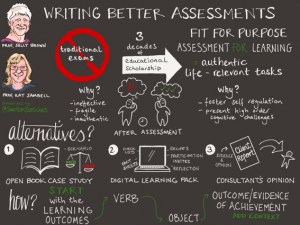
Raspberries, (w)Riting, Reflection, Rage, Reading, Running around, Ruminating and Relaxing
17 Aug
Designing Better Assignments Post-Covid
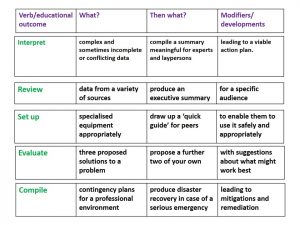
Although I haven’t posted for 6 weeks, I’ve been pretty busy over the summer.
- Participating in the formal defence of her thesis by my dear friend Dr Hetty Grunefeld at Utrecht University. I should have been there in person in the ancient university hall and celebrating with her and other members of the PhD by Publication Group I’ve been convening for years, but it wasn’t to be so I did it from my study in an approximation of academic dress as requested
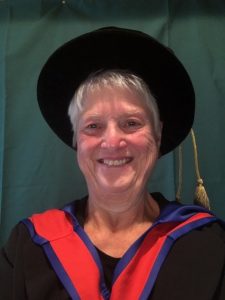 and was overjoyed to see her graduate;
and was overjoyed to see her graduate; - Running a three-day virtual writing residential for PebblePad clients on starting to get published on learning, teaching and assessment;
- Leading a workshop for Leeds Beckett senior staff aiming to achieve Principal Fellowship of the Higher education Academy;
- Mentoring half a dozen colleagues pro bono during lockdown to help them keep up momentum with their life and writing goals;
- Drafting a chapter on doing a PhD by Publication for a volume expected to be published in 2021;
- Completing and submitting my SEDA Senior Fellowship reflection, which is a condition of my ongoing status retention;
- Continuing to work with Kay Sambell on our suite of publications on managing assessment during Covid-19 and beyond. We are in particular working on ensuring that HE assessment in the future never reverts to the ghastliness of largely-ubiquitous, traditional unseen time-constrained exams, instead using more fit-for-purpose and authentic assessment approaches. We hope that one of these will be published by SEDA in the Autumn and another will be posted on this site and Kay’s very soon.
- We’ve also been working on a new post on ‘Writing better assignments in the post-Covid19 era: approaches to good task design’ Writing-better-assignments-in-the-post-Covid19-era.docx (4498 downloads) which I hope colleagues will find useful when moving away from traditional exams. While we’ve been writing it , I’ve been driven to rage and fury at the current UK totally-foreseeable problems our government has inflicted on our nation’s A-level students by applying a flawed algorithm to predicted results for students applying to universities right now, resulting in devastating injustice, reinforcing my strong reservations concerning exams!
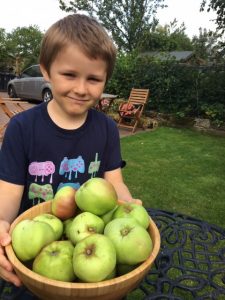 Meanwhile Phil and I have been coping with domestic lockdown with plenty of home-based productive activities including lots of fruit harvesting (fabulous raspberries, redcurrants and cucumbers this year) and produce making, reading novels (Ali Smith’s Autumn, Winter, Spring and Summer are what I’m reading at the moment), socially distanced interaction with our Newcastle grandchildren including garden yoga classes, much baking and socially-distanced outdoor catching up with friends.
Meanwhile Phil and I have been coping with domestic lockdown with plenty of home-based productive activities including lots of fruit harvesting (fabulous raspberries, redcurrants and cucumbers this year) and produce making, reading novels (Ali Smith’s Autumn, Winter, Spring and Summer are what I’m reading at the moment), socially distanced interaction with our Newcastle grandchildren including garden yoga classes, much baking and socially-distanced outdoor catching up with friends.
In the Autumn I’m looking forward to more writing with Kay, continuing to work with NUI Galway on their academic promotions scheme, a couple of virtual keynotes (I’m getting better with Zoom but still struggling with Teams despite a broadband upgrade) and working with another university helping them enhance NSS scores, following successful outcomes from my collaborations at Solent University last year.
This is my seventieth year and I had planned to spend much of it traveling abroad, which obviously isn’t happening, but I’m still managing to have a busy, engaging and largely enjoyable time.
PhD event, Publishing , Principal Fellowships and Pootling
28 Jun
Solstice, Sunshine, Setting questions and Substantial new article
1 Jun
It’s hard to be productive in this lovely sunshine, but I’m doing my best! This week should have been the Solstice Conference at Edge Hill University, but of course this is happening virtually rather than live this year. You might like to catch up via their website on Wednesday with a narrated PowerPoint which Kay Sambell and I have created entitled ‘Building bridges to the future: assessment which promotes learning post coronavirus‘. The hashtag for the conference is #solstice2020, and the link from which our narrated PowerPoint can be downloaded is: https://figshare.edgehill.ac.uk/articles/Prof_Sally_Brown_and_Prof_Kay_Sambell/12408968/2
I have also decided to start a new occasional feature called Question of the week. This has come about because people are regularly writing to me with questions of a pedagogic nature, the answers to which may prove valuable to others. Let me know if you have a question or would like to add to my answers. My response to the first question, which is on online replacements for traditional lectures, can be downloaded here: Question-of-the-week-w.docx (676 downloads)
Additionally, Kay and I have produced a new paper called ‘The changing landscape of assessment: some possible replacements for unseen time constrained face-to-face invigilated exams’ in which we argue that some of the alternatives that universities have put in place for the coronavirus contingency should be made permanent, and that we should use this as an opportunity to make some radical and substantial reconfigurations to assessment in the future to make it more authentic. A particular feature is the comparison table where we explore the pros and cons of diverse assessments that can be done virtually. You will find our new post here: The-changing-landscape-I-June-w.docx (4991 downloads)
I hope all these will be useful to colleagues. They are all open educational resources so please feel free to share them, but if you do please acknowledge where they came from. We like to hear where our work is being useful!
Travel-free impact, Translation and Tea
11 May
These are strange days indeed when most of what we are doing that might be useful to anyone else is being done at home. Kay Sambell and I have been delighted that people have been using our recent work on alternatives to unseen, time-constrained invigorated exams, and tips for assessing effectively and authentically under coronavirus conditions. Of course we very much hope this thinking will have usability in the future as well as we think about different ways of assessing in optimum ways. You might be interested to note that we have had feedback that this work has been found useful across the UK, in the Netherlands, Ireland, South Africa, Australia, Canada, New Zealand, and most recently Japan. For those of you who read Japanese, here is a link to our work on the Osaka University website. https://www.tlsc.osaka-u.ac.jp/project/onlinelecture/tips03.html
And the picture below shows me and Phil at our recent street party, suitably socially distanced.
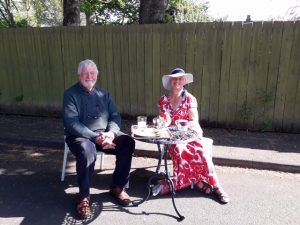
Complex Coronavirus Challenges and Cheerfulness
24 Apr
